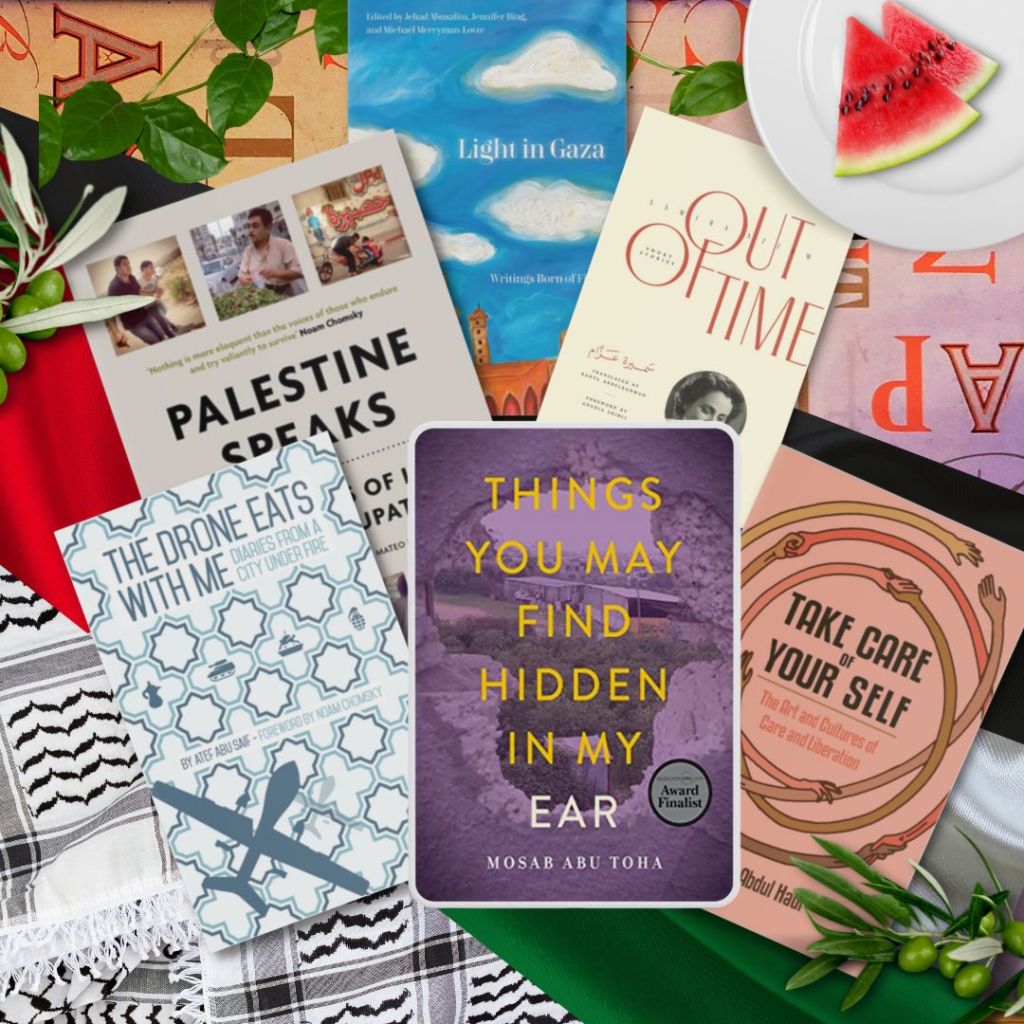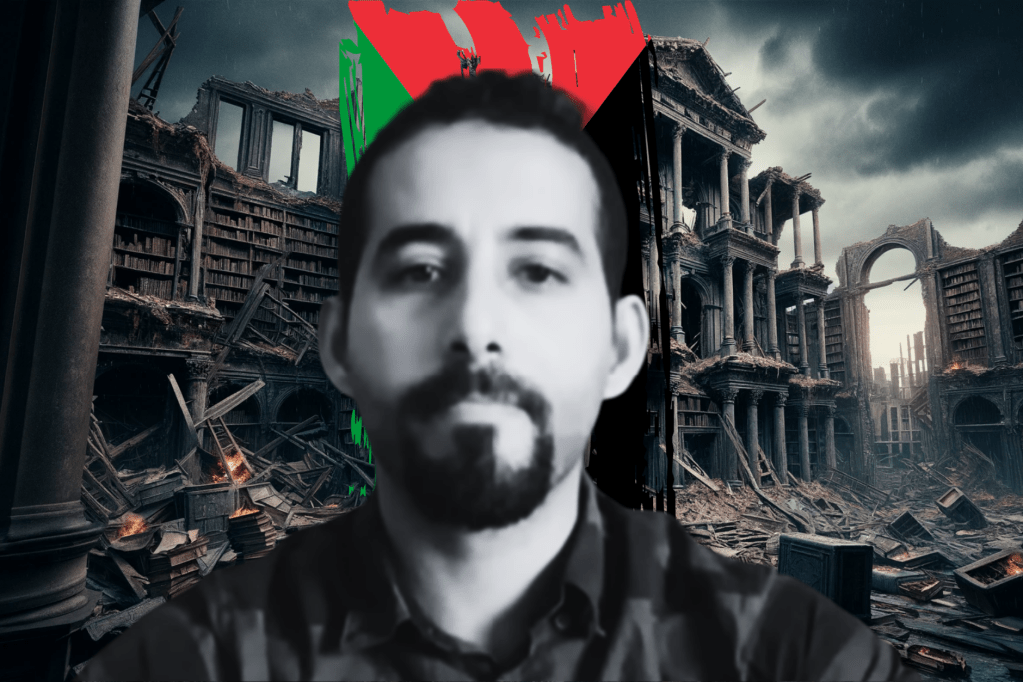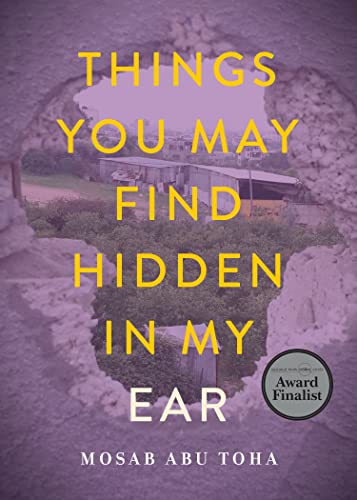December 5th marks the end of Read Palestine, where hundreds of publishers provided their books for free in a bid to support authors in the region. Among the reading list with Mosab Abu Toha‘s poetry collection 2022 “Things You May Find Hidden in My Ear: Poems From Gaza,” which I had both the satisfaction and sombre experience of reading.

Read: #ReadPalestine week: 300 publishers support free book cause
The Palestinian essayist is known for founding Gaza’s only English language library, and was recently released by Israeli forces after there were reports he had been taken by authorities. He has subsequently posted on social media that his family including his wife and three children have fled to Egypt. But he lamented: “My heart and mind are not yet safe as my parents and siblings and their little kids continue to be in danger.”
Who is poet Mosab Abu Toha?
MEET THE POET
Mosab Abu Toha
Palestinian poet Mosab Abu Toha, a scholar and librarian hailing from Gaza, has dedicated his life to his homeland.


Holding a degree in English language teaching and literature, he served as an English teacher at United Nations Relief and Works Agency (UNRWA) schools in Gaza from 2016 to 2019. Additionally, he is renowned as the visionary founder of Gaza’s first English-language library, the Edward Said Library.
In the academic realm, Abu Toha’s accomplishments extend globally. In 2019-2020, he assumed the role of a Visiting Poet at Harvard University‘s Department of Comparative Literature. During this period, he also worked as a Visiting Librarian at Harvard’s Houghton Library and held the position of a Religion, Conflict, and Peace Initiative Fellow in the Harvard Divinity School. His influence spread beyond Harvard as he delivered talks and readings at distinguished institutions such as the University of Pennsylvania, Temple University, and the University of Arizona. Furthermore, he graced the American Library Association (ALA) Midwinter Meeting in Philadelphia in January 2020 with his insights.
Continuing his engagement with academic communities, in October 2021, Abu Toha was featured as a speaker in Notre Dame’s Literatures of Annihilation, Exile, & Resistance lecture series, where he discussed his poetry and the impactful work he carries out in Gaza.
As a columnist for Arrowsmith Press, Abu Toha has contributed thought-provoking writings, reflecting his experiences and perspectives from Gaza. His work has been featured in prominent publications such as The Nation, Arrowsmith Press, and Literary Hub. His poetic prowess has also earned him recognition, with his poems finding a home on the Poetry Foundation’s website, in Poetry Magazine, Banipal, Solstice, The Markaz Review, The New Arab, Peripheries, and various other esteemed journals.
What is the meaning of Things You May Find Hidden in My Ear?
Abu Toha talks about a time when he had to have ear surgery in Boston, hence the poem “Things You May Find Hidden in My Ear” is dedicated to his doctor Alicia M. Quesnel, MD. In this, he asks her to gently open up this up during the operation, pleading to keep his mother’s voice, Arabic songs, English poems he recites to himself, as well as the sounds of the “chirping birds in our backyard.” However, he implores her to remove the “drone’s buzzing sound, the roar of an F-16, the screams of bombs falling on houses.” Speaking to Arablit in 2022, he adds: “Some things [in there] are precious to me. Other things are horrific, and I wanted her to rid my ear of them. Our ears are memories of sweet and bitter moments.”
What he demonstrates in this collection is the juxtaposition of violence and beauty, and how the two can be difficult to separate.
Read Palestine week: Abu Toha’s book featured
With this solemn prospect, reading the anthology work is even more relevant to the current situation in Gaza, where almost 16,000 people have been killed in retaliation for the October 7th attack on Israel by Hamas. A short-lived ceasefire is now over and the Israeli bombing has commenced again. Abu Toha called for an end to the violence, saying: “Please stop the carnage. Stop your inhumanity. Be human again.”
Read: Abu Toha: prominent poet from Gaza ‘released’
In “Palestine A-Z,” the award-winning scholar brings together an alphabet of the macabre, collocating a child’s teaching tool with the sinister aspects of this bloody 75-year occupation. ‘A’ may be for ‘apple,’ but for Abu Toha, it is also a fruit that “fell from the table on a dark evening when man-made lightning flashed through the kitchen, the streets, and the sky, rattling the cupboards and breaking the dishes.” For the 30-year-old who has never really known a world outside of this conflict, (apart from several working stints abroad), ‘X’ is not only for a colourful xylophone that the children treasured, but it is also for x-ray, after he was injured as a 16-year-old in 2009, and he had pieces of shrapnel lodged in his neck and forehead.
The poem highlights the enduring reality that Gazan children have grown up for countless generations in a harsh environment, emphasising that the recent surge in violence didn’t occur in isolation. For each letter, there are two sides of the story – one bittersweet, full of longing for a better life, the other is a tale of everyday horror.
“Gaza is a city where tourists gather to take photos next to destroyed buildings or graveyards.
Mosab ABu Toha, ‘Palestine A-Z’ from “Things You May Find Hidden in My Ear”
A country that exists only in my mind. Its flag has no room to fly freely, but there is space on the coffins of my countrymen.”
This extends beyond poetry and literature; it also applies to the realm of learning numbers. Indeed, there’s no more effective means of reinforcing the dread than viewing it from a child’s perspective.
"Children learn their numbers best
"when they can count how many homes or schools
"were destroyed, how many mothers and fathers
"were wounded or thrown into jail."
The impact of war on children
“Leaving Childhood Behind” reminded me of a visit to the War Childhood Museum in Sarajevo, Bosnia. Like Gaza, the country faced a devastating conflict as well as ethnic cleansing in the 1990s, and the museum displays the small innocent tokens left behind by those fleeing any war. It is one of the world’s largest archive dedicated to the experience of growing up during the war – something Abu Toha is starkly aware of. He writes:
"When I left, I left my childhood in the drawer and on the kitchen table. I left my toy horse in its plastic bag."
The abandoned toys symbolise a loss of childlike virtue, and by the end of the poem Abu Toha admits “I hated death, but I hated life, too,” indicating a premature transition into adulthood, a prospect that many children face in the region.
During this period, a frequently encountered narrative involves labelling regular civilians as members of Hamas. In “My Grandfather Was A Terrorist,” the poet addresses this issue, illustrating the kindness of average citizens before being forcefully removed by settlers. He tended to his fields, he picked oranges and lemons, and in the end:
"left some water on the table, his best, lest the guests die of thirst after their conquest."
He then subsequently spent his life in a UN refugee camp, a breadwinner of ten. These injustices have yet to be fully confronted, with people compelled to vacate their homes after generations, if not centuries, of family residency. These challenges persist today, as we witness reports of intensifying attacks in the West Bank. This theme is perpetuated in a poem called “Wounds,” where Abu Toha makes clear that Israeli forces are attacking non-Hamas targets, and that the only person who cares about Hamas are the extremists themselves.
"Our ears were not Hamas. Our eyes were not Hamas. The one who ordered the killing, the one who pressed the button thought only of Hamas."
The impact of displacement on identity and aspirations
Another aspect of his poetry is the path not taken. In an interview in the final pages of the book, he tells American poet Ammiel Alcalay about being inspired by Palestine’s unofficial laureate, the renowned Mahmoud Darwish, who travelled and lived in Haifa, Moscow, Cairo, Beirut, Tunis, Paris, Jordan, and Ramallah, and the general existential nature of his work.
“What was I looking for? Was I looking for Ithaca, was I looking for the lost homeland, or was I looking for the child I had once been?”
Mahmoud Darwish
Abu Toha contemplates the profound impact of displacement on personal potential, drawing inspiration from the legacy of Darwish. He believes that Darwish symbolises the unrealised potential one could have achieved if not compelled to leave their homeland.
Read: Hiba Kamal Abu Nada: Palestinian poet killed in Gaza
Abu Toha underscores the contrast between the child Darwish was in Lebanon and the child he could have become in al-Birwe, stating, “there are many Mosabs in the world—the Mosab who was born in Gaza in al-Shati Camp; the Mosab I could have been if my grandparents were not expelled from Jaffa […] I could have been a scientist or a historian or a researcher of marine life. But now I’m living in Gaza. And I don’t feel that I was a child, I think I was running from something. Maybe from my childhood. Maybe my childhood was left behind forever, because I never felt that I was a child.” His reflections underline the lasting impact of displacement on one’s identity and aspirations.
“Things You May Find Hidden in My Ear” embodies a fusion of devastation and magnificence, illustrating how amid the perpetual struggle for survival, there exist everyday delights in the minutiae of life—whether it be in the melodies, the olive groves, or the warm aroma of freshly baked bread. Abu Toha reaffirms that these circumstances won’t deter them from living to the fullest, and yet a part of him will forever contemplate the potential of the child that might have been.
[…] Read: Things You May Find Hidden in My Ear: love letter to Gaza children – review […]